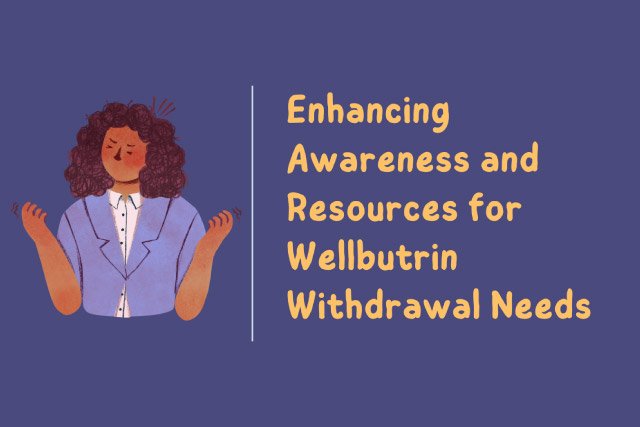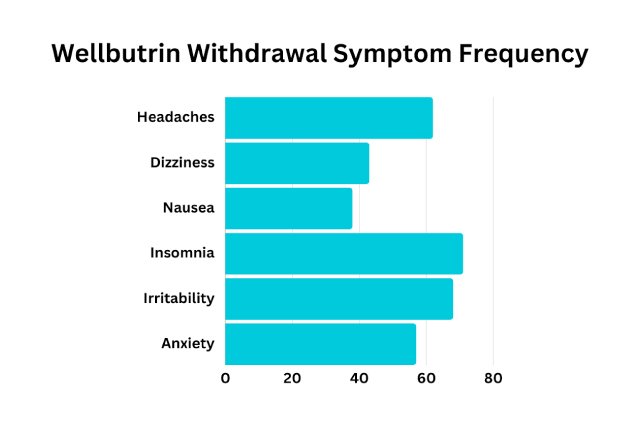
Wellbutrin (bupropion) is a popular antidepressant. It is used to treat major depressive disorder and seasonal affective disorder. Yet, discontinuing Wellbutrin can lead to difficult withdrawal symptoms. There exists a gap in knowledge and resources for individuals experiencing Wellbutrin withdrawal. There exists a gap in knowledge and resources for individuals experiencing Wellbutrin withdrawal.
1. The Unique Nature of Wellbutrin Withdrawal
Unlike many widely prescribed antidepressants. They mainly affect serotonin. Wellbutrin focuses on dopamine and norepinephrine. It affects these key neurotransmitters. This underlies both its benefits and the risks of stopping.
Dopamine contributes to motor control, motivation, pleasure, and various cognitive faculties. Meanwhile, norepinephrine helps regulate vigilance, wakefulness, and arousal. So, by raising these two neurotransmitters, Wellbutrin can improve energy. It can also improve focus, motivation, and alertness. It helps those with depression.
However, when Wellbutrin intake stops, the brain faces a sudden deficit of key chemicals it had grown adopted. Then, the drops cause a set of mostly brain and mind withdrawal symptoms.
These effects are documented. They include dizziness, shaking, appetite disturbances, and sleep problems. The sleep problems range from drowsiness to severe insomnia. Sensory issues like headaches or phantom pains are also common.
Stopping Wellbutrin can cause neuropsychiatric effects. These involve trouble with mood regulation, especially higher anxiety and agitation. They also involve suicidal thoughts in vulnerable people. Difficulty thinking, confusion, lack of motivation, and mental disorientation may also occur.
These effects are caused by dopamine and norepinephrine. They cause suffering that is different from the “brain zaps” and gut issues common with SSRI discontinuation. They emerge shortly after ending Wellbutrin. This is because its half-life is short compared to many antidepressants. Symptoms typically persist for 7-14 days but can linger longer depending on individual attributes.
Informed clinicians should proactively warn patients about this withdrawal syndrome. They can work together to minimize the risk of misinterpreting distressing but temporary effects. These effects are often seen as signs of a mental health relapse that requires going back on Wellbutrin.
2. Addressing the Gap in Wellbutrin Withdrawal Understanding

Research shows that about 20% of people stop taking antidepressants. They face withdrawal symptoms for up to two weeks. However, few patients and many providers know about this “discontinuation syndrome.” Failing to see the predictable nature of withdrawal can lead to misdiagnoses. They may be of recurrence or new psychiatric issues. This can lead to unnecessary medication changes rather than proper support.
Wellbutrin’s unique mechanism affects dopamine and norepinephrine. This makes those stopping it prone to a distinct set of symptoms. However, many clinicians fail to expect them. We urgently need to fill the knowledge gaps. They are about predicting, managing symptoms, and treating wellbutrin withdrawal, and it is crucial to do this to avoid unnecessary suffering. More research is needed on stopping bupropion. It could provide advice and help patients. Also, teaching the public and professionals to recognize the signs can help. They are signs of Wellbutrin discontinuation syndrome. It can reduce the risk of misdiagnosing withdrawal as a chronic mental illness. We must remove filters of ignorance and stigma. This is crucial for addressing the real challenges. About 1 in 5 individuals face these issues when stopping this popular antidepressant.
2.1. Integrating Yoga into Wellbutrin Withdrawal Management
Yoga can harmonize the body and mind. It can help in navigating the emotional and physical landscape. This is the landscape of withdrawing from antidepressants like Wellbutrin. Yoga, especially focusing on sensuality, encourages a deep connection with one’s senses and emotions. It creates an environment of mindfulness and presence.
Yoga sensuality is about more than the body. It’s about embracing the now and building deep body awareness and connection. This approach can be beneficial for individuals experiencing Wellbutrin withdrawal as withdrawal symptoms like irritability, agitation, and depression emerge.
Yoga can be a sanctuary for self-care and emotional grounding. Yoga has a sensual side. It focuses on fluid movement, breath rhythm, and awakening the senses. This can help ease withdrawal. It accomplishes this by promoting calmness, enhancing mood, and improving overall well-being.
Adding yoga to a daily routine during withdrawal can offer a natural and empowering way to cope. It’s a reminder. Through withdrawal, there is a chance to reconnect with oneself. It’s a time to care for the body and mind. It’s a time to move toward healing with grace and resilience. Embracing Wellbutrin withdrawal is unique. Yoga can guide people to a more peaceful transition.
3. Strategies for Managing Wellbutrin Withdrawal
Patients and their healthcare teams must work together. They must be careful. Then, they can stop Wellbutrin without much distress. However, certain lifestyle adjustments and self-care techniques may also ease the transition. Key tips include:
3.1. Very gradually taper medication dosage under medical guidance
Suddenly stopping Wellbutrin may shock the brain’s delicate chemical balance. This can provoke intense withdrawal. Doctors usually make slow dosage reduction schedules. They last 4-8 weeks for most patients. Some patients get even longer timelines based on individual factors. Lowering the amounts happens bit by bit. It gives the brain crucial time to re-adapt its dopamine and norepinephrine signaling. This happens without causing system shock.

The chart could visualize the percentages for each withdrawal symptom side-by-side, allowing easy comparison of the prevalence rates amongst people discontinuing Wellbutrin.
3.2. Proactively adjust daily lifestyle and routines
Certain lifestyle changes can minimize discomfort from some Wellbutrin withdrawal symptoms:
- Healthy sleep hygiene, balanced nutrition, and regular exercise support neurological stability.
- Reducing stress exposure and adding relaxing activities alleviates anxiety and sensory hypersensitivity.
- Avoiding alcohol and excessive caffeine prevents aggravating mood and sleep disturbances.
- Making reasonable accommodations at work or school prevents overwhelming cognitive burdens.
Such stabilizing lifestyle measures help strengthen coping capacity, making withdrawal feel more manageable.
3.3. Judiciously utilize over-the-counter comfort remedies
No medications treat Wellbutrin withdrawal itself. However, some OTC aids can relieve troubles like headaches, nausea, and insomnia. These drugs relieve pain and reduce inflammation. They also ease anxiety and help with sleep. But they do this in the short term without further disturbing neurotransmitters. However, patients should keep talking to doctors. They should talk about using these extra tools for managing symptoms. They should also watch closely for any bad effects.
3.4. Connect with community support and mental health resources
You can confide in trusted friends, family, or peer support groups. You can talk to them about challenges during Wellbutrin withdrawal. Doing so can provide emotional release and helpful coping strategies. Counselors also guide people struggling with anxiety, low mood, or thought disturbances. They guide them by developing healthy mental health habits. Those facing it find deep comfort. They know the distress is shared and conquered with support.
With proper preparation, compassionate experts can help. They know Wellbutrin’s unique profile. They can guide individuals to make personalized plans to stop the medication. But truly improving the Wellbutrin withdrawal process requires expanding support. This support must go beyond traditional medicine.
4. The Vital Role Of Professional Support
Doctors supervise withdrawal. It maximizes safety and minimizes suffering. It’s for those stopping Wellbutrin or any psychiatric drug. Doctors and therapists control treatment logistics. They also offer vital biopsychosocial support during a tough transition.
4.1. Gradual withdrawal scheduling
The plans are based on dosage, prior treatment duration, risk factors, and history. Subsequently, physicians create them for each patient. Gradually, they lower doses over weeks or months. Importantly, they do not abruptly deprive the brain. This approach prevents shocking delicate neurotransmitter systems and provoking distress.
4.2. Multimodal symptom management
Doctors suggest remedies targeting specific physiological, neurological, or emotional issues arising during withdrawal. Therapists address mood, motivation, and thought process disturbances using counseling. Integrative techniques like mindfulness ease anxiety.
4.3. Continuity of comprehensive care
Providers give constant reassurance while closely monitoring patients’ mental health through withdrawal. They prescribe different medications, psychotherapies, or holistic well-being strategies. They ensure care continues for the original conditions treated by Wellbutrin.
Cultivating strong patient-provider partnerships maximizes confidence facing the Wellbutrin withdrawal process. However, empowering peer support communities reinforces this. It demonstrates that patients do not have to navigate such challenging paths alone.
5. Advocating For Better Wellbutrin Withdrawal Resources

Succeeding at quitting Wellbutrin requires full support. This is especially true for the mental health impacts. They affect people enduring withdrawal. Yet currently, resources are fragmented and awareness limited.
- Support groups like The Wellbutrin Withdrawal Group provide community understanding. The understanding comes from peers who are also facing struggles. But information on such groups needs boosted circulation.
- Some rehab facilities offer tailored inpatient Wellbutrin withdrawal programs. However, insurance barriers can limit accessibility for many.
- The insights could inform future improvements. For example, they could identify genetic markers linked to symptom severity. However, few studies focus specifically on Wellbutrin withdrawal. Such studies are scarce compared to those on other drugs.
6. Overcoming Insurance Barriers To Care
Health insurance complexities present further obstacles to accessing Wellbutrin withdrawal support. Navigating coverage to get appropriate, affordable care requires planning and self-advocacy. Useful tips include:
6.1. Learn about your insurance benefits
Review your medication and mental health benefits. Do this to understand what they cover and the limits. This aids discussions with doctors about viable care options.
6.2. Consult doctors before abruptly stopping medication
Suddenly, stopping antidepressants raises risks. These include withdrawal, relapse, and even self-harm or suicidal thoughts. Doctors can advise on safely transitioning care within insurance limitations. Be open about financial limits. Stopping treatment is rarely wise without a doctor’s advice.
6.3. Research state/federal subsidies
Government assistance programs expand options for uninsured and underinsured individuals. Consult programs like Medicaid, Medicare, community health clinics, and pharmaceutical discount services.
6.4. Appeal insurance claim denials
If important aspects of a treatment plan are deemed “not medically necessary,” fight the decision with help from medical staff. Doctors can write letters to justify interventions. They can provide research evidence. They can even speak to insurance representatives.
The confusing healthcare system shouldn’t block access to Wellbutrin withdrawal care. Seek multiple expert opinions to understand all viable paths while being your fiercest advocate. The process takes perseverance, but the reward is peace of mind.
7. Finding Support In Shared Community
Besides adding resources and giving personalized medical and mental healthcare. Building connections throughout treatment reduces the loneliness of Wellbutrin withdrawal. It also makes it more hopeful. Online mutual aid groups like The Withdrawal Project create spaces for people to share experiences. They find reassurance that they aren’t alone in their struggles and exchange advice. Local in-person support groups are organized by past Wellbutrin users. Psychotherapists and community health organizations also organize them. They bring together people facing similar problems for strength in solidarity.
Core benefits of strong support communities include:
- Normalizing challenges: Recognizing symptoms as shared struggles rather than personal weaknesses reduces self-blame and alienation.
- Exchanging guidance: Peer insights supplement expert recommendations with “real-world” tested coping strategies.
- Offering compassion: Simply listening and validating someone else’s suffering profoundly impacts during distressing times.
- Forging meaning: New friendships made through common adversity motivate ongoing recovery and create joy.
Connection transforms Wellbutrin’s withdrawal. It changes it from a lonely trial into a shared journey of growth and healing. Policy reform, advanced research, and dedicated services combine extensive resources. Peer empowerment provides the best support for Smooth Sailing Through Wellbutrin Discontinuation.
8. Comparison of Wellbutrin Withdrawal vs Other Antidepressants
| Wellbutrin Withdrawal | SSRI Withdrawal | SNRI Withdrawal | TCA Withdrawal | |
| Key Neurotransmitters Affected | Dopamine, Norepinephrine | Serotonin | Serotonin, Norepinephrine | Norepinephrine, Serotonin |
| Average Withdrawal Duration | 1-2 weeks | 1-4 weeks | 2-4 weeks | 2-4 weeks |
| Most Common Physical Symptoms | Headaches, Tremors, Insomnia | Gastro Issues, Fatigue | Headaches, Insomnia, Dizziness | Headaches, Insomnia |
| Most Common Psychological Symptoms | Anxiety, Irritability, Suicidal Thoughts | Anxiety, Irritability | Anxiety, Irritability, Mania | Anxiety, Irritability |
| Average Tapering Duration | 4-8 weeks | 2-8 weeks or longer | 4-8 weeks or longer | 4-8 weeks or longer |
Conclusion
Stopping Wellbutrin is tough. Additionally, it brings expected but hard challenges. Moreover, these challenges are both emotional and physical. Notably, they affect about 20% of long-term users. We can employ various strategies to optimize outcomes for all facing this rocky transition. Firstly, by combining knowledge of its unique withdrawal profile. Secondly, by organizing care resources, breaking access barriers, and building communal understanding. Recognizing struggles as shared and conquerable makes Wellbutrin withdrawal feel less lonely. Importantly, compassion and education unite us, fostering a sense of community. Consequently, they can ensure nobody suffers alone again.
FAQs
What makes Wellbutrin withdrawal unique compared to other antidepressants?
Wellbutrin acts more on dopamine and norepinephrine, not serotonin. This causes different discontinuation symptoms. They include tremors, impaired concentration, and mood instability.
How long do most people experience Wellbutrin withdrawal symptoms?
Symptoms typically last 1-2 weeks. However, they may last longer, depending on individual differences.
Does the dosage or duration of Wellbutrin treatment impact the severity of withdrawal?
Indeed, more drugs and a lengthier treatment period exacerbate withdrawal symptoms. Consequently, they amplify the intensity and prolong the duration of these adverse effects.
What lifestyle changes can help manage Wellbutrin withdrawal?
Healthy coping strategies include stress management, exercise, proper sleep, and nutrition. They also include workplace accommodations and avoiding alcohol and caffeine.
When should you contact a doctor about Wellbutrin withdrawal?
Contact a doctor if symptoms are severe, prolonged, or impede daily functioning. Also, seek help for emotional crises, suicidal thoughts, or trouble tapering dosage.
Can other medications help ease Wellbutrin withdrawal?
No medications treat bupropion withdrawal. But, some OTC options like pain relievers and sleep aids give modest relief.
What supporter resources are available for managing Wellbutrin withdrawal?
Support groups, counseling services, and crisis hotlines offer various help to individuals who are stopping Wellbutrin. Additionally, informational hubs assist. These resources can provide valuable support and guidance when discontinuing Wellbutrin.
How do you appeal insurance denials for Wellbutrin withdrawal treatment?
Strategies include having doctors write justification letters. They provide research evidence and contact insurance companies when coverage is denied.
What are the most dangerous or severe Wellbutrin withdrawal symptoms?
The most concerning effects are on the brain. They include seizures and higher suicide risk. They also cause severe emotional distress from anxiety, agitation, or mood swings.
Can you successfully discontinue Wellbutrin after taking it for years?
Yes, but after long-term Wellbutrin treatment, you must slowly taper the dosage over months. You also need close medical monitoring.
How do genetics impact the likelihood or severity of Wellbutrin withdrawal?
Moreover, some genetic markers are linked to feeling intense neurotransmitter changes. Consequently, these changes cause worse withdrawal symptoms.
Can withdrawal symptoms indicate you should resume Wellbutrin treatment?
Not always; however, it is crucial to talk with doctors to determine if withdrawal effects are mistaken as relapse. Consequently, this mistake can lead to restarting Wellbutrin.
Is there anything you should avoid while experiencing Wellbutrin withdrawal?
Do not stop suddenly. Also, avoid caffeine and alcohol. Do not operate heavy machinery if you are impaired. And avoid major life changes until you are stable.








